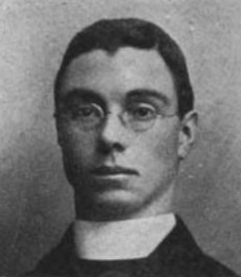Peter Coffey facts for kids
Quick facts for kids
Peter Coffey
|
|
|---|---|
 |
|
| Born | 9 April 1876 Rathrone, Enfield, Ireland
|
| Died | 7 January 1943 (aged 66) Maynooth, Ireland
|
| Education | Maynooth College University of Louvain University of Strasbourg |
| School | Neoscholasticism |
| Institutions | Maynooth College |
Peter Coffey (born April 9, 1876 – died January 7, 1943) was an Irish Roman Catholic priest and a very important philosopher. A philosopher is someone who studies big questions about life, knowledge, and reality. Coffey was known for his work in a style of philosophy called neo-scholasticism.
Contents
Peter Coffey's Life and Work
Peter Coffey grew up in Ireland. He went to school at the Meath Diocesan Seminary in Navan. Later, he studied at St Patrick's College, Maynooth. He continued his studies at the University of Louvain and the University of Strasbourg to earn his doctorate degree. He became a priest in 1900.
A Professor of Philosophy
From 1902 until he passed away, Coffey was a professor at Maynooth College. He taught subjects like Logic and Metaphysics. Logic is about how we think clearly and correctly. Metaphysics explores the basic nature of reality and existence. During his time, many people thought Peter Coffey was one of the smartest Catholic thinkers in Ireland.
His Important Books
Peter Coffey wrote several books that were used to teach future priests and religious scholars. These books explained a type of philosophy called Thomistic philosophy, which is based on the ideas of a famous philosopher named Thomas Aquinas.
Some of his well-known books include:
- The Inductive Sciences, an Inquiry into some of their Methods and Postulates (1910)
- The Science of Logic, in two volumes (1912)
- Ontology: The Theory of Being (1912)
- Epistemology, in two volumes (1917)
These books were widely used in English-speaking countries until about the 1960s. He also wrote articles for magazines like the Irish Ecclesiastical Record and the Catholic Encyclopedia.
What Others Thought of His Work
Interestingly, Peter Coffey's books received different reactions from other famous thinkers. In 1913, a well-known philosopher named Ludwig Wittgenstein wrote a very critical review of Coffey's book, The Science of Logic. This was the only book review Wittgenstein ever published.
However, in 1917, the famous poet and critic T. S. Eliot had a positive view of Coffey's book, Epistemology. Epistemology is the study of knowledge itself – how we know what we know.
Finding Common Ground
In 1903, Peter Coffey wrote an article called The Hexahemeron and Science. In this article, he tried to find a way for natural sciences and the Catholic Church to understand each other. He believed that both sides had some good points and some areas where they could improve.
Views on Workers' Rights
Peter Coffey also had strong opinions on social issues. He supported trade unionism, which is when workers join together to protect their rights and improve their working conditions. However, some of his ideas about labor issues were not popular with his superiors at Maynooth College.
 | Audre Lorde |
 | John Berry Meachum |
 | Ferdinand Lee Barnett |

